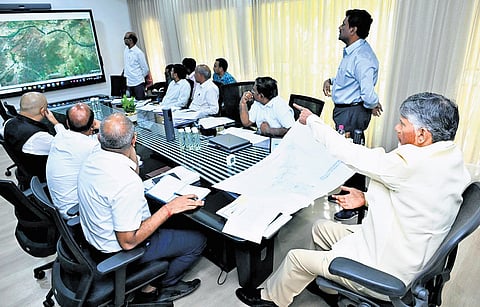

VIJAYAWADA: Chief Minister N Chandrababu Naidu reiterated his commitment to diverting Godavari River water to Banakacherla as a long-term solution to make Andhra Pradesh drought-proof. Chairing a review meeting on irrigation projects at his residence in Undavalli on Sunday, the Chief Minister outlined his vision of providing irrigation water to every acre of land in the State, turning it 100% drought-free.
Naidu emphasised that eight combined districts, including the three North Coastal districts, Godavari districts, Krishna, Guntur, Prakasam, and Rayalaseema, will benefit significantly from the Polavaram project.
Emphasising that around 2,000–3,000 TMC of surplus Godavari water is flowing into the sea annually, he outlined plans to take up the Banakacherla project. The project aims to divert Godavari water to the Krishna River and further to the Bollapalli reservoir via the Nagarjuna Sagar Right Bank Canal, ultimately channeling it to Banakacherla through a 31-km-long tunnel. The project targets to utilise 280 TMC of Godavari flood water during the rainy season, helping mitigate water scarcity in drought-prone regions of the State, especially Prakasam, Nellore and Rayalaseema districts.
Naidu acknowledged the project’s financial and logistical challenges. The estimated cost ranges between Rs 70,000–Rs 80,000 crore, requiring the acquisition of 54,000 acres of land and 4,000 megawatts of power. Despite the hurdles, he is optimistic about completing the project with Central assistance. During a recent visit to New Delhi, Naidu briefed Union Finance Minister Nirmala Sitharaman on the project’s importance and sought financial aid.
He directed officials to expedite necessary approvals and complete the tender process promptly. Special Chief Secretary (Irrigation) G Sai Prasad, Principal Secretary (Finance) Peeyush Kumar, and other senior officials from the Irrigation Department participated in the meeting.
Naidu believes the Banakacherla project will be a transformative step for Andhra Pradesh, ensuring water security, enhancing agricultural productivity, and bolstering the State’s economy. Despite the financial constraints, he affirmed that the government is determined to execute the project as it holds the potential to change the water landscape of the State permanently.